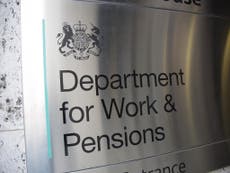Giving the government free rein during the coronavirus pandemic is eroding our civil liberties
The Coronavirus Act is producing ugly consequences and is detrimental to many people

Your support helps us to tell the story
From reproductive rights to climate change to Big Tech, The Independent is on the ground when the story is developing. Whether it's investigating the financials of Elon Musk's pro-Trump PAC or producing our latest documentary, 'The A Word', which shines a light on the American women fighting for reproductive rights, we know how important it is to parse out the facts from the messaging.
At such a critical moment in US history, we need reporters on the ground. Your donation allows us to keep sending journalists to speak to both sides of the story.
The Independent is trusted by Americans across the entire political spectrum. And unlike many other quality news outlets, we choose not to lock Americans out of our reporting and analysis with paywalls. We believe quality journalism should be available to everyone, paid for by those who can afford it.
Your support makes all the difference.MPs are waking up to the idea that giving any government free rein, much less one of the character of the current administration, is a dangerous thing to do.
This brings us to the debate over the Coronavirus Act, the measures it contains, and the possibility of a Tory backbench revolt.
Much of the debate about the Act, which is up for renewal, has centred on the civil liberties implications of handing the government unfettered powers and the impact of its coronavirus restrictions on the economy. Especially the economy.
But there is another killer lurking in its provisions, which those with any concern for the rights of disabled Britons, not to mention basic human rights, should pay close attention to.
The implications are ugly indeed. And killer might be the operative word.
The Coronavirus Act changes the Care Act of 2014, which outlines how local councils should carry out carers and needs assessments for disabled people, among other things.
Unless MPs force a change, local councils are no longer required “to carry out detailed assessments of people’s care and support needs in compliance with pre-amendment Care Act requirements”.
I’m quoting the guidelines issued to them above.
They are also relieved of the requirement to “prepare or review care and support plans” in line with previous guidance. Instead, they are expected to provide "person-centred care planning which provides sufficient information to all concerned, particularly those providing care and support”.
Whatever the hell that means.
They have been told to take “all reasonable steps” to “meet needs”, but it says they might be unable to do that (not least because of the cash central government isn’t providing). In that case they have to prioritise “the most pressing needs”.
Can you see the problem with that? I’ll spell it out: if your disabilities are sufficiently serious that you need a care assessment, your needs are going to be pressing under any circumstances.
Telling councils to make a judgement on who to help and who to ignore is a bit like telling them to choose between whether they give Janet or John access to food. If they choose John, Jane might last a bit longer because she’s smaller and needs fewer calories. But it’s not really a choice at all because, ultimately, one or the other of them is going to starve.
Hang on, though, the guidance mentions “human rights” and the need to respect them. In theory, that ought to help. In theory.
The problem is that the UK government has already been found to have trampled all over them with respect to disabled people by a United Nations panel. So in reality, this is probably about as helpful to those affected by the Act as treating a serious case of Covid-19 with Lemsip.
It might just be my cynical mind, but it looks to me like whoever drafted the guidelines included the phrase “human rights” purely for show.
Local authorities, terminally short of cash, are usually very good at finding ways to get around even clear guidelines, as I can testify from bitter personal experience. These ones are sufficiently woolly to make it easy.
Even if an enterprising lawyer finds a good case and rolls the dice by challenging a council’s decision, and I hope one does, it will inevitably be too late for the people who are going to get laid out as a result of this particular haymaker.
By the way, if you think this doesn’t affect you, you’re wrong. The disabled community is one you can join simply by leaving for work in the morning.
All it needs is for you to step in front of a car. Or have a lorry run over you while you’re on your bike. Which is how I got my membership card stamped (literally).
In the early days of recovering, I was able to call on the help of family, which was a good thing because the care arrangements fell at the first hurdle when I was released from hospital.
Not everyone is able to do that, and plenty of people have needs that are too complex for family to effectively manage.
Kamran Mallik, who runs Disability Rights UK, has today written to MPs to urge them “to ensure that we have the parity of rights to survive the second wave, and the parity of rights to live, as non-disabled people do, as independent, empowered citizens”.
Malik makes the point that far from back-pedalling on support, now is actually the time for government to be doing more. And he’s right.
Two-thirds of the people killed by coronavirus have had disabilities and/or long term health conditions. The only time I’ve been as scared as when I woke up with that horribly distinctive cough was when I knew that cursed cement truck was going to land on my ribs – and I saw the face of the son I thought I wouldn’t see again floating before my eyes.
Relenting on the requirements of local authorities to support people with disabilities with the care, and assistance they need to live, threatens to leave many people in need feeling like that every damn day. Ditto their friends and loved ones.
MPs should heed Malik’s call.





Join our commenting forum
Join thought-provoking conversations, follow other Independent readers and see their replies
Comments